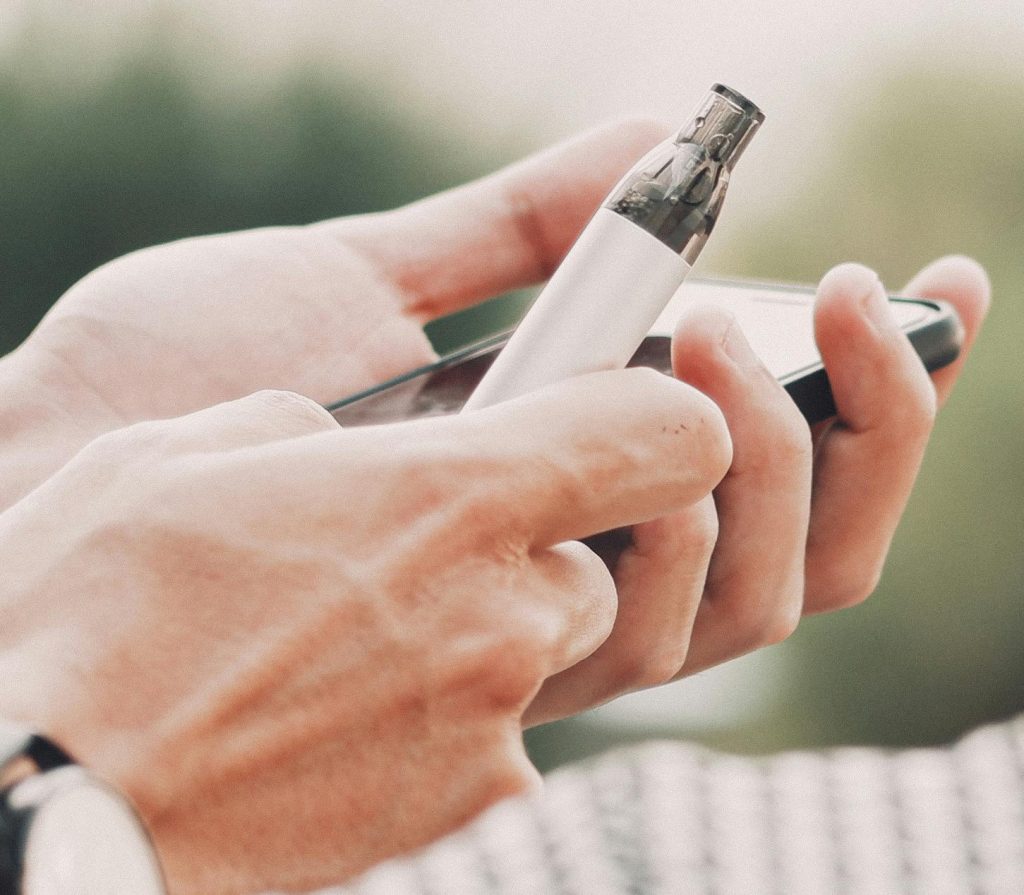
This is the second part of an article from our previous issue. Find the full version at motifri.com/ flav-vapes
To better understand the public’s opinion regarding the recent flavored vape ban, I spoke to numerous Rhode Islanders across various professions and backgrounds looking for critiques. The common thread between most was that the public believes that bans, as a general practice, don’t work. One local police officer who asked to withhold his name said, “People will find another way to get their hands on it. It may even generate an even more unhealthy alternative.” To support this, a college-based social worker stated that the ban may provoke people, especially children, to make their own juices – leading to potential harm because they don’t know what they’re doing. A different approach was suggested (fittingly enough) by an accountant who said, “Rhode Island policy should only implement higher taxes on flavored vapes, then put the money back into education and anti-smoking efforts.”
Furthermore, some vaping truck drivers made the argument that getting rid of vape flavors may send some people back to smoking cigarettes, as the ban encourages a “cold turkey” approach to stopping. Still, many others believe that flavored vapes are likely getting more people addicted to nicotine than it is helping to quit. Other vapers said they have found ways of coping with the ban, engaging in things like exercise and nicotine replacement therapy, and even sucking on Push Pops with similar flavors to old vapes. One individual I spoke to, a dental assistant, had positive thoughts about the ban, saying, “I think it’ll benefit the younger populations. I vape and only started because the cucumber JUUL tasted so good. I tried it when some kids on the bus asked if I liked salad and if I liked cucumber. I was fourteen.”
Meanwhile, a local smoke shop worker I spoke to informed me that many employees are getting verbally harassed by frustrated customers. The employee said, “This impacts people that work at vape stores negatively. A lot of people are out of jobs. And those that are still working are being treated as though they’re the ones responsible for the ban. I’ve had numerous people call the store and call me names that are too inappropriate to write. But this is probably just a symptom of withdrawal.” Without the old, flavored nicotine, are Rhode Islanders getting more irritable? Though this is what is going on in the public’s opinion, the best bet to really understand how the vape flavor ban will affect RI is to look at our neighbor, Massachusetts, and examine the effects since their own ban back in November 2019, when they became the first state in the US to ban the sale of all flavored tobacco and nicotine products, including flavored electronic cigarettes as well as menthol cigarettes. Their ban was introduced to help reduce youth smoking, according to the Campaign for Tobacco Free Kids (CTFK). Although the rate of cigarette smoking among youth continues to decrease in Massachusetts, 1,500 young people still become cigarette smokers every year. In 2019, approximately one-third of Massachusetts high school students reported currently using vapes, while more than half tried them at least once (CTFK). In addition, more high school students used e-cigarettes than all other tobacco products combined, and they used them at a significantly higher rate than adults. But since their ban passed, what has happened?
According to data from the Massachusetts Department of Revenue, the number of new tobacco retail licenses issued decreased by 53% from October 2018 to August 2021, showing that fewer people are opening new smoke shops, as well as there being a 5.8% decrease in license renewal for existing smoke shops. Sales figures show that all vape sales in MA decreased by 89.4% from 2019 to 2020 going from selling more than 600k vapes every four weeks in 2019, to less than 100k in 2020. However, a survey conducted by Tobacco Induced Diseases of 7,368 participants concluded that Massachusetts individuals aged 1324 saw a only 5% reduction in vape usage, meaning that although legal sales in MA dropped tremendously, usage really has not gone down much. Kids are still getting vapes elsewhere. This shows the potential of a black market for vapes, which has been proven by data from the Massachusetts’ Multi-Agency Illegal Tobacco Task Force: In 2021, a whopping 105,802 vapes were seized by the state police. Overall, it’s hard to say whether or not Rhode Island’s new ban will work as intended, and whether or not it will be permanent. All I know for sure is that my younger brother, as well as his girlfriend (ages 23 and 22, vapers since 14 and 15) have since decided to quit nicotine altogether, using the recent vape flavor ban as an excuse to get off the stuff for good, a decision they’ve ultimately made on their own, though they’ve had a little nudge in the right direction thanks to some governmental-level moral crusading. •
For RI teens looking to quit smoking, there are free resources available at mylifemyquit.com as well as specialized support by online chat, text (36072), and phone (855-891-9989). Rhode Islanders ages 18 and older can call 1-800-QUIT-NOW (1-800-784-8669) to get free counseling by phone and online chat, as well as FREE Nicotine Replacement Therapy including patches, gum, or lozenges mailed direct to their homes.